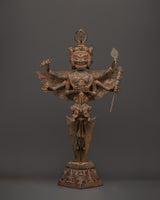
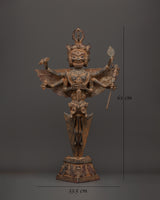
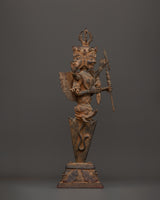
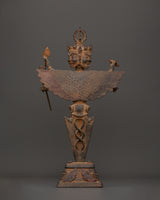
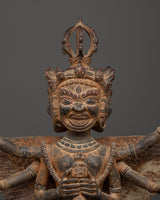
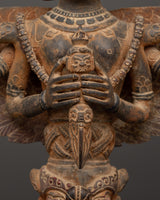
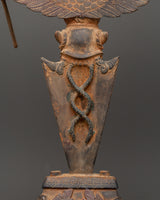
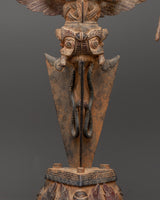
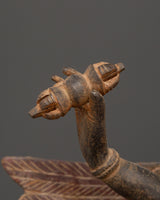
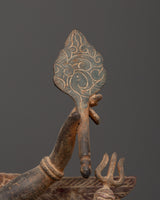
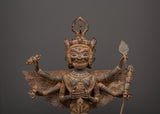
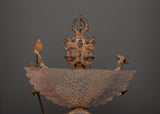
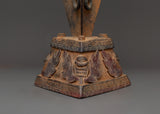
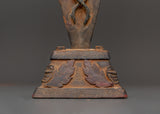
Vajrakilaya Phurba Statue | Wrathful Tibetan Guardian Deity
Vajrakilaya Phurba Statue | Wrathful Tibetan Guardian Deity
--------------------------------------------
Size: 61cm (Height) x 33.5cm (Width)
Weight: 7.89kg
Materials: Iron
--------------------------------------------
About The Ritual Item :
This Vajrakilaya statue with Phurba powerfully portrays the wrathful guardian deity, revered for his capacity to tear through spiritual barriers and remove both inner and external negativity. This Tantric symbol exudes protective energy with wings spread and many arms holding sacred artifacts such as the ceremonial dagger (phurba), vajra, and trident. The base is constructed like a phurba, representing the sharp edge of ignorance and ego.
Vajrakilaya, a wrathful incarnation of Vajrasattva, is adored in Tibetan Buddhism for his unparalleled capacity to eliminate impediments to spiritual growth. Every element of this sculpture, from its expressive, wrathful expression to its ritual equipment's beautiful, intricate details, encourages concentration and dedication throughout advanced Tantric rituals and contemplative activities. He is frequently summoned for personal empowerment, spiritual cleansing, and eliminating obstacles to enlightenment.
This sculpture is a profound spiritual treasure and a reminder of transformational power. This Vajrakilaya Phurba is perfect for altars, sacred places, or as a valuable collector's item, expressing powerful compassion and steady strength to protect your area with divine energy.
Introduction To The Phurba :
The ceremonial dagger (Sanskrit: Kila; Tibetan: phurba) is essential for expelling evil and is considered especially effective in neutralizing the forces obstructing Tantric Buddhist practice. It has ancient origins, first appearing in the Indian Rg Veda as the core blade of the vajra used by Indra to destroy the primordial cosmic snake Vritra. Kila, a peg or stake in Sanskrit, was most likely associated with Vedic sacrifices. Meditation on the Vajrakila Tantra, an early Indian scripture first promoted in Tibet in the eighth century by Padmasambhava, one of the founding teachers of Tibetan Buddhism, is used to invoke the three-headed Vajrakila Buddha.
How to set up your own Buddhist Shrine?
Find a clean, quiet, and uncluttered spot
Set up an altar table, and cover it with an altar cloth that calls to you
Place your sacred item (statue, thangka, or a picture of Buddha) at the center




















